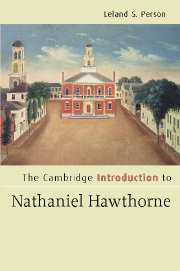Chapter 5 - Hawthorne's critics
Published online by Cambridge University Press: 05 June 2012
Summary
Hawthorne has been a subject of serious study ever since Henry James's 1879 book (Hawthorne) in the American Men of Letters series, and critics have approached his writing from many angles. Most recent studies have used historical approaches, emphasizing either his use of older historical settings, particularly seventeenth-century Puritan New England, or his connections to the nineteenth-century world in which he wrote. Hawthorne knew his history, but the trend in Hawthorne scholarship, as it is generally in American literary studies, is toward stressing the cultural context offered by the politically volatile world in which he lived. The decade of the 1990s was dominated by New Historicist analyses of Hawthorne and his writing that place him within that culture, often unflatteringly, because of his relatively conservative views toward questions of gender, class, and race. More recent criticism seems to be taking a more balanced view.
Biography
The most thorough modern biography is James R. Mellow's Nathaniel Hawthorne in His Times (1980). As his title suggests, Mellow pays attention to the historical and social context of Hawthorne's experience, and he provides detailed accounts of events in Hawthorne's life. Mellow's biography overshadowed Arlin Turner's Nathaniel Hawthorne, published in the same year, but Turner also emphasizes the connections between Hawthorne's writing and his culture. Since Mellow's and Turner's, most biographical treatments of Hawthorne have become more pointedly focused. Edwin Haviland Miller's Salem Is My Dwelling Place (1991) focuses on Hawthorne's personality, emotions, and family relationships.
- Type
- Chapter
- Information
- The Cambridge Introduction to Nathaniel Hawthorne , pp. 114 - 127Publisher: Cambridge University PressPrint publication year: 2007

